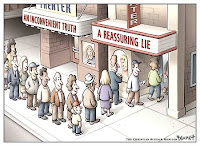
By Gary Berg-Cross
Robert Jense n is a journalism professor at the University of Texas at Austin. He writes with radical passion about important topics in exciting ways and can be read at CommonDreams.org under his byline. He’s very quotable as in his conclusion to an article called “The Case for a Morality of Radical Caution”
n is a journalism professor at the University of Texas at Austin. He writes with radical passion about important topics in exciting ways and can be read at CommonDreams.org under his byline. He’s very quotable as in his conclusion to an article called “The Case for a Morality of Radical Caution”
On complex moral questions, we almost always know less than we wish we could know. History counsels that we remain radical in our pursuit of justice and sustainability, committed to creating a better world. But we also should exercise caution, aware not just of what we know but what we don’t, and possibly can’t, know.
In reading RJ I’m often introduced to other works and authors that he quotes from. This was very much the case in reading his “Hope is for the Lazy: The Challenge of Our Dead World”, where quotes the first verse from one of Wendell Berry’s Sabbath poems:
It is hard to have hope. It is harder as you grow old,
for hope must not depend on feeling good
and there is the dream of loneliness at absolute midnight.
You also have withdrawn belief in the present reality
of the future, which surely will surprise us,
and hope is harder when it cannot come by prediction
any more than by wishing. But stop dithering.
The young ask the old to hope. What will you tell them?
Tell them at least what you say to yourself.
[--Wendell Berry, “Sabbaths 2007, VI,” in Leavings: Poems (Berkeley, CA: Counterpoint, 2010), p. 91-93.]
Jensen’s article is an edited version of an earlier “sermon” delivered July 8, 2012, at St. Andrew’s Presbyterian Church in Austin, TX and a follow up to an earlier message on Hope is Weak. You can get the Obama reference which RJ modifies to say that Weak was too optimistic a characterization. Readers should not be turned away by the fact that this appeared as a sermon. The message is important in secular realms as well as before religious congregations.
Why the change from weak to dead? Jensen offers several reasons starting with”
“ to be a hope-monger or a hope-peddler today is not just a sign of weakness but also of laziness, and sloth is one of the seven deadly sins. Don’t forget that, as good Christians, we try to avoid those.”
He goes on to argue that our world is “not broken, it is dead. We are alive, if we chose to be, but the hierarchical systems of exploitation that structure the world in which we live -- patriarchy, capitalism, nationalism, white supremacy, and the industrial model -- all are dead. It’s not just that they cannot be reformed, but that they cannot, and should not, be revived. The death-worship at the heart of those ideologies is exhausting us and the world, and the systems are running down. That means we have to create new systems, and in that monumental task, the odds are against us. What we need is not naïve hope but whatever it is that lies beyond naiveté, beyond hope.”
If this sounds depressing, blame it may also be as accurate as we hear in a sermon. Jensen covers the dismal, tipping point environmental scene pointing the same Nature article I blogged on earlier in “New, but biologically Poorer ,World A-Coming?” To this he adds Christian Parenti, Tropic of Chaos: Climate Change and the New Geography of Violence.)
I’ll leave the interested reading to read the article for its wisdom and quotes from James Baldwin including the snippet - “Not everything that is faced can be changed; but nothing can be changed until it is faced.”
I'll close with this part of the piece challenging the religious community with addressing reality and not just coping:
Avoiding reality because it is  harsh is not a winning strategy. We are not going to win by praying for deliverance by the hand of God or waiting for deliverance through the wizardry of gadgets. Religion and technology, understood historically and used wisely, are both important tools to help us cope. But religious and technological fundamentalists are weak and lazy, because they spin fanciful stories about how we can magically avoid a reckoning with the human capacity for desecration.
harsh is not a winning strategy. We are not going to win by praying for deliverance by the hand of God or waiting for deliverance through the wizardry of gadgets. Religion and technology, understood historically and used wisely, are both important tools to help us cope. But religious and technological fundamentalists are weak and lazy, because they spin fanciful stories about how we can magically avoid a reckoning with the human capacity for desecration.
There may, in fact, not be a winning strategy available to us at this point in history. But we have an obligation to assess the strategies available, and work at the ones that make the most sense. That is how we make a credible claim to being human. We don’t become fully human through winning. We embrace our humanity by acting out of our deepest moral principles to care for each other and care for the larger living world, even if failure is likely, even if failure is inevitable…..
To repeat one of those hard-to-bear truths: Nature doesn’t negotiate. Nature sets limits. Nature bats last. If we don’t want to be accused of weakness or laziness, we have to face not only the truth we can bear, but all of the truth, which is too much to ask us to bear.
Photo Credits:
Avoiding Reality http://www.markstivers.com/cartoons/Cartoons%202004.html
Inconvenient truths: http://sciblogs.co.nz/open-parachute/tag/climate-change/page/2/
Robert Jensen Photo:
http://article.wn.com/view/2012/05/29/DEAR_JOURNALISM_STUDENTS_Dont_Mean_To_Intrude_But_Your_Profe/
No comments:
Post a Comment